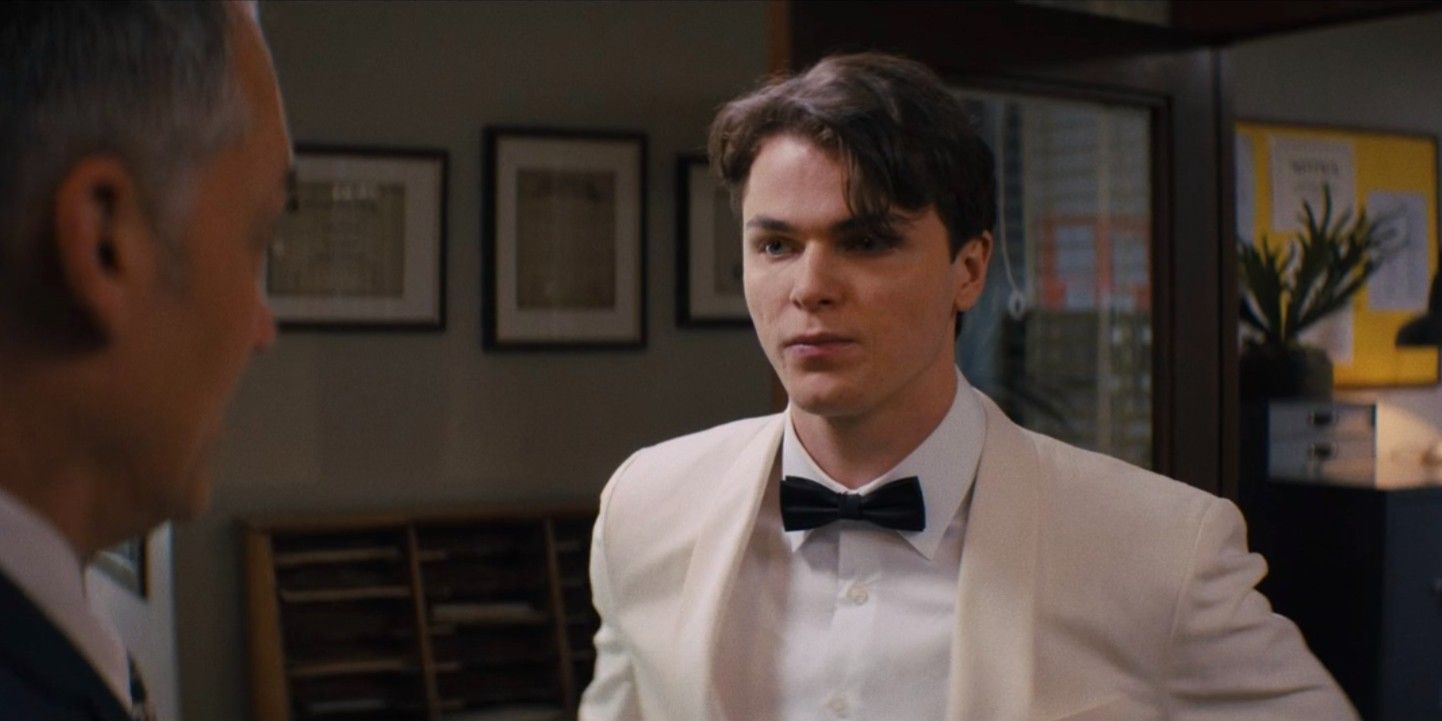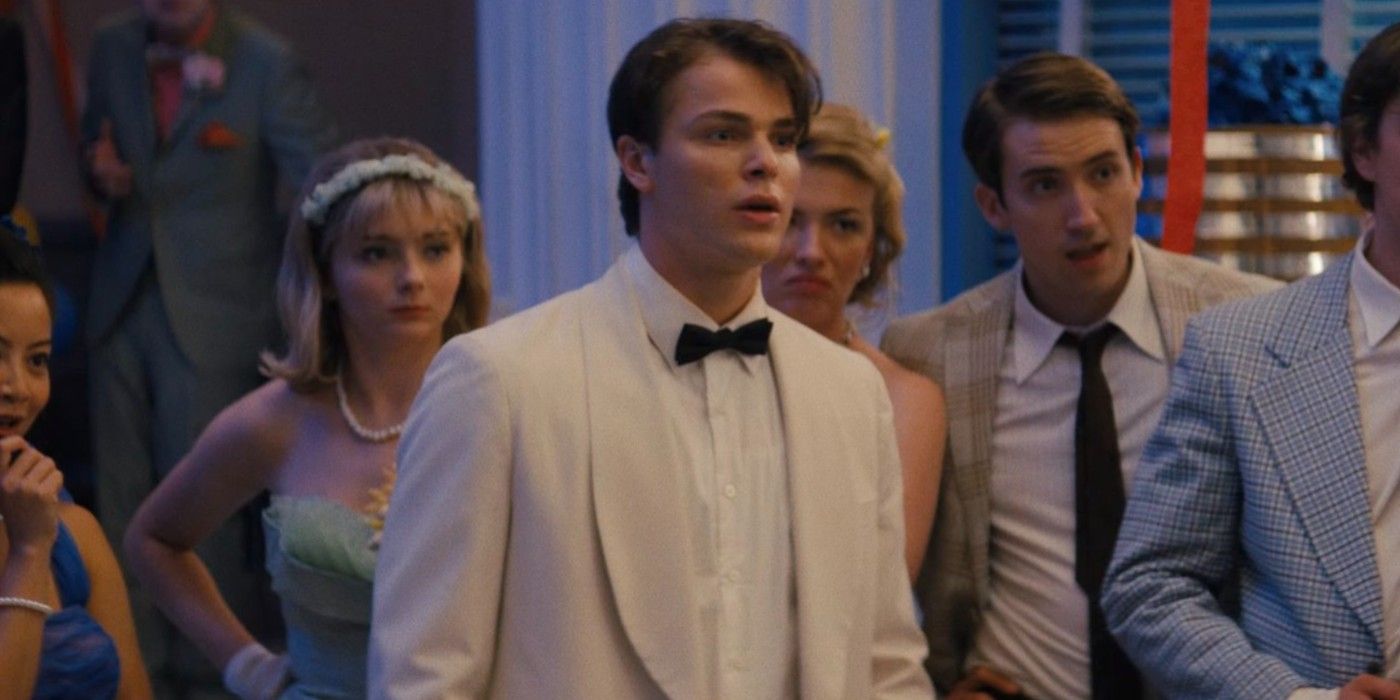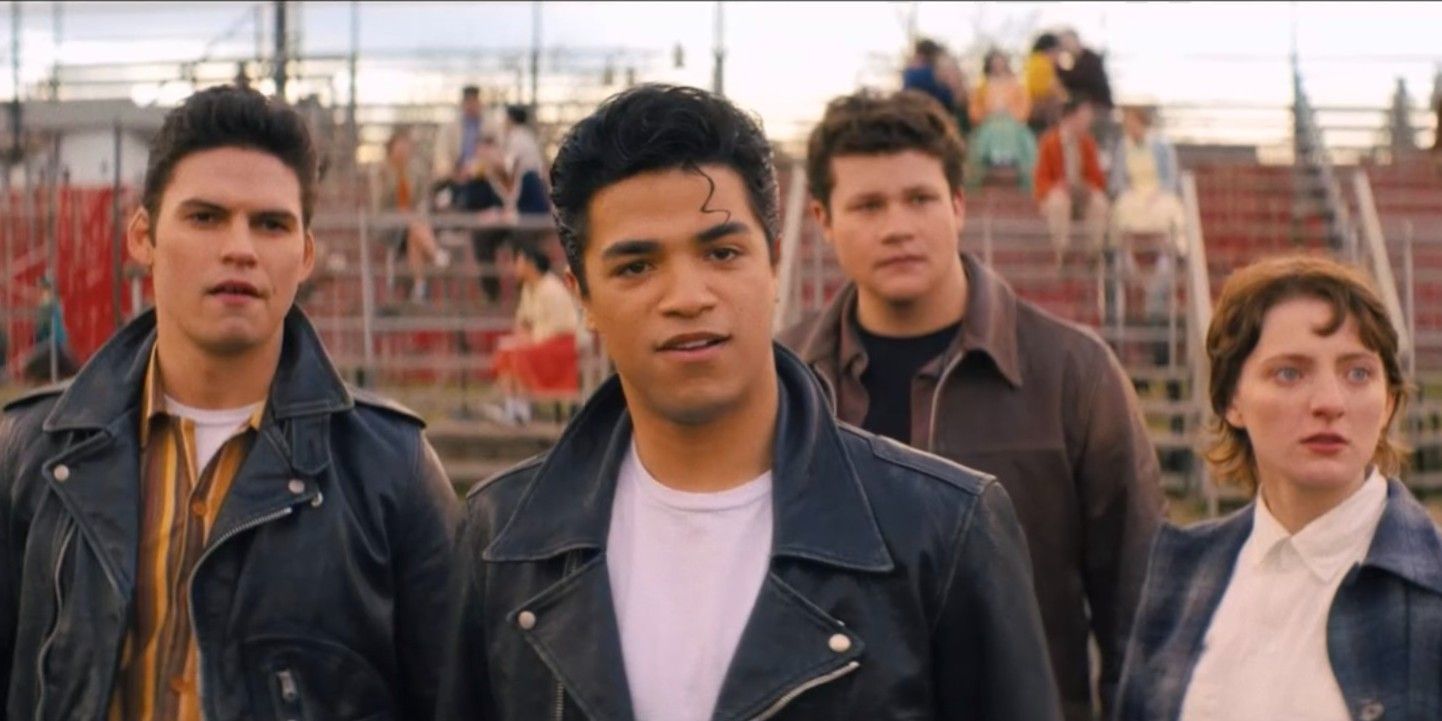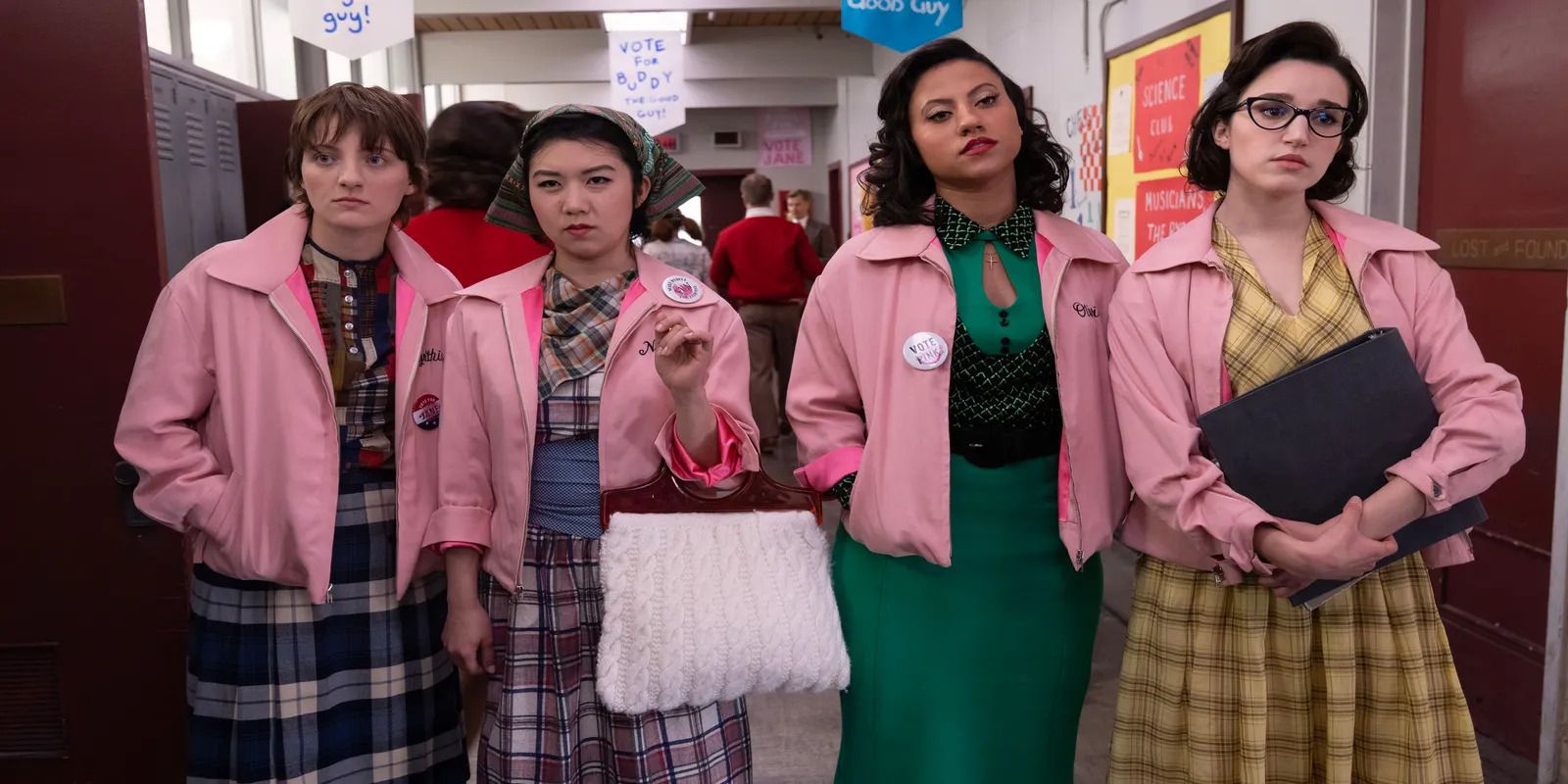Paramount+’s Rise of the Pink Ladies has proven to be both an exciting and nuanced revisit to the Grease franchise. Set four years prior to the original Grease movie, Rise of the Pink Ladies shows the beginnings of Rydell’s titular greaser group before Frenchy, Rizzo, Jan, and Marty take it over. Featuring an all-new cast, original musical numbers, and impressive choreography, Rise of the Pink Ladies capitalizes on what makes Grease so good while giving the franchise a modern spin.
Thanks to its talented ensemble cast, Rise of the Pink Ladies offers a multifaceted perspective on Rydell High’s entire student body, not just the Pink Ladies. Every featured Rise of the Pink Ladies character has layers, but perhaps none more than student council president Buddy, who is portrayed by Jason Schmidt. Though he sometimes makes mistakes along the way, Buddy’s character arc helps provide a sympathetic angle to the often antagonistic popular kids at Rydell.
Screen Rant spoke with Jason Schmidt about being part of Rise of the Pink Ladies and the evolution of Buddy’s arc in the Grease prequel.
Jason Schmidt on Grease: Rise of the Pink Ladies
Screen Rant: Buddy is interesting because he takes on so many different roles in Rise of the Pink Ladies. Sometimes he’s kind of an ally, and sometimes he’s more of an antagonist. I was wondering how you personally viewed Buddy when you were approaching playing his character, and how do you hope audiences view him?
Jason Schmidt: It was really interesting to watch the show come out and to see the reaction [to] Buddy, because initially he’s kind of going through his jerk phase, y’know? But when I’m, as an actor, on set, thinking about [Buddy], it’s always positive, [because] he’s trying to do the best he can. He’s this character with this huge heart, and he makes a bunch of mistakes because he doesn’t really know who he is yet or what he believes in, but [...] even as he’s fumbling and tripping up, he’s trying to do his best. Even [when] playing those really difficult conversations or saying those really difficult things he had to say, I’m still saying it from a good place, and people are receiving it how it’s supposed to be received, as the negative jerk, and so that was really interesting to watch that happen.
I hope they see the complexity of Buddy. He is this beautifully nuanced character, [...] because he’s this high schooler [who] has no idea what he’s doing...he only believes what his dad tells him, and he begins to doubt those things. [So,] I hope they see the complexity of a teenager in Buddy.
A huge theme we see with characters like Buddy and Susan in Rise of the Pink Ladies is the importance of maintaining that perfect image, and we see that start to shift with episodes 7 and 8. How do you see Buddy’s relationship with his image, and why do you think we start to see this concern of a breakdown as the series progresses?
Jason Schmidt: We talked a lot on set about how Buddy and Susan were kind of products of their parents. They’re not the villains. The time, the 50’s are the villain, y’know? And so, for Buddy, his view on image comes from his dad [...]. His dad is running for mayor the next year, and so he keeps enforcing to Buddy that he has to keep up this image so they look like a family of leaders.
He has kind of a negative relationship with [image], and I don’t think he really understands it yet... He begins to, in [episodes] 7 and 8, kind of question what that view on image is, and watching him go through that is tough, I think. Especially for [episode] 8, which I just saw for the first time last night, and I was like, “Wow he was in a dark place! Buddy was in a dark place in [episode] 8!” But I think rightfully so - I think you gotta hit a valley before you can find your way up to the mountain, so he’s going through it right now.
I’m definitely interested to see how that takes shape as things go on, which leads me to my next question. We’ve been talking a little bit about how Buddy is really shaped by his dad, and obviously finding out the truth about the student council election and how his dad rigged it for him is a huge turning point for his character. Can you give us any hints about how that might play out in the rest of the season?
Jason Schmidt: I think you’re just gonna have to wait to see. But I will say that he didn’t really know who he was before he found out. Buddy had some idea of who he was based on his accomplishments, what his dad had said about him, and what his dad had instilled in him, so he was like, “Okay I’m a football player, I’m a class president. I don’t really know who Buddy is, but I know those things are a part of Buddy.”
But then when his dad says that those things were not even things he accomplished by himself... All of a sudden he has no identity because he’s not even the accomplishments he has, and now he doesn’t even know who he is past that at all. [H]e has to [...] figure out what’s next for him, who he’s gonna be, [and] if he’s gonna decide that for himself or let other people decide it for him.
Admittedly, one of my favorite musical numbers from the show so far was Buddy’s big number “Pulling Strings.” Do you have a favorite song from Rise of the Pink Ladies so far?
Jason Schmidt: I think my favorite song [is] Wally’s number with Hazel ["Land Don't Look So Bad"]. I just think it’s beautifully shot - I had no idea that [Maxwell Whittington-Cooper] sang until that number! [H]is voice is just butter, I mean it’s just butter! So that’s my favorite number. ...I think [it] hits the perfect mesh of the Grease genre and the Rise of the Pink Ladies genre, y’know? It’s right in the middle, and I think that’s beautiful.
Touching on the original Grease movie a little bit: the popular kids aren’t nearly as prominently featured in Grease as they are in Rise of the Pink Ladies, so I was wondering what you think taking a closer look at characters like Susan and Buddy adds to the Grease universe?
Jason Schmidt: I think the beautiful thing of a series is that you have ten hour-long episodes, so you get to dive into each character and see what’s actually going on with them, and I think it just adds complexity. It allows you to see the '50s and the world and these teenagers as more than just the tropes that you can explore in an hour and a half, y’know? And so you get to dive into Susan and Buddy and see why they’re acting the way they’re acting and see their struggles with their parents. [...] I think it adds these beautiful layers that allow you to be touched a little more.
What for you was the most fun scene to shoot in Rise of the Pink Ladies?
Jason Schmidt: My number [“Pulling Strings”] was extremely fun [because of] all the dancing in it, and I think the song is just beautiful and touching.
[Also], in Episode 8, when Buddy gets a little drunk at the dance, and he’s speaking to the camera. That might have been my favorite thing I shot, just because I got to be wild. Annabel, our director and our showrunner, was like, “Just kind of make choices, [...] just like…do things, y’know? Just like, pick up a cupcake, I don’t care.” [S]o we were going through and I got to take somebody’s drink and eat a cupcake, and it was just fun.
What is your favorite aspect of being part of Rise of the Pink Ladies and the Grease franchise, and what is the most challenging aspect?
Jason Schmidt: I think my favorite aspect is that no matter what, the energy is always good. These characters are - I kind of view it as like a Ted Lasso type of a thing where these characters are all positive, y’know what I’m saying? They all have some downer moments, but at the end of the day, even Susan and Buddy, or Neil and Rosemary, [or] the other Socs, [...] have good in them and bad in them, and you get to see all the good and bad. And the energy of it allows for that as well, because it’s Grease! It’s not some downer drama, y’know? It’s upbeat and fun, and so you get to see the best of everybody at some point, which is really cool.
[T]he hard part is telling the tough stories of the '50s that I’m so grateful that our show is telling. I think it tells it in a beautiful way that doesn’t shove it in your face, but it lets you know that these characters are dealing with hard things [...] that people are still dealing with today, and I’m so grateful that we do it in such a beautiful, nuanced way.
Circling back to Buddy’s current arc, especially in light of Episode 8, we’ve seen throughout the series that Buddy’s dad seems to have a pretty clear path in mind for Buddy’s future. What do you think Buddy will do moving forward, after Rise of the Pink Ladies?
Jason Schmidt: Hmm. I think Buddy was pretty decent at acting, I must say. I think after being so conformist for so long, he’s going to be craving some type of release, a looseness. And I think he might’ve gotten a little taste of that with acting, and obviously he wasn’t great, but I think his kind of natural charisma allowed him some type of skill towards it. So, maybe he goes to Hollywood...y’know’, Rydell’s in Southern California, [so] Hollywood can’t be too far. Get him in movies! That’d be fun.
That would be super fun, especially if it turned out he was in like an actually big movie. Do you see Buddy being a part of the play as one of the first moments that he kind of breaks the mold? Do you think being in the play is being his true self?
Jason Schmidt: I think the relationships [he has] with the people in the play like Hazel help him be his true self. I don’t know that [...] he’s falling in love with acting, but I think he’s experiencing a looseness, and it’s his decision to do that, to do the play. Football was never his decision, student council was never his decision, but he has this time on his hands, so he gets to choose something of his own, and it’s fun! I think he enjoys it a lot. And so maybe later he looks back and he goes, “Oh you know, I actually did really like that. Maybe there’s something there!”
Final question: what do you hope viewers take away from Buddy’s story in Rise of the Pink Ladies?
Jason Schmidt: I hope they take away the complexity of a teenager. [Buddy’s] going through so much, he’s still figuring himself out, and [...] if you are a teenager watching it, I hope they know that that’s okay. I was figuring out so much at that age, and you’re gonna make some mistakes along the way.
And what Buddy does is he has the courage to take a step back, look at himself, struggle with the fact that he wasn’t the person he wanted to be for a little bit, but then at the end of the day, he’s gonna have to make a decision of if he wants to change or if he doesn’t. [E]ven thinking about that decision is a courageous thing, and so I hope it gives people some courage to alter their path if they don’t feel like they’re on the path that’s right for them.
About Grease: Rise of the Pink Ladies
The musical series takes place four years before the original “Grease". In 1954, before rock ‘n’ roll ruled, before the T-Birds were the coolest in the school, four fed-up, outcasts dare to have fun on their own terms, sparking a moral panic that will change Rydell High forever.
Check out our other interviews for Rise of the Pink Ladies here:
- Justin Tranter (songwriter) & Jamal Sims (choreographer)
- Ari Notartomaso (Cynthia) & Tricia Fukuhara (Nancy)
- Jason Schmidt (Buddy), Madison Thompson (Susan) & Shanel Bailey (Hazel)
- Angelina Kekich (costume designer)
- Marisa Davila (Jane) & Cheyenne Isabel Wells (Olivia)
- Madison Thompson (Susan)
New episodes of Grease: Rise of the Pink Ladies air Thursdays on Paramount+.




